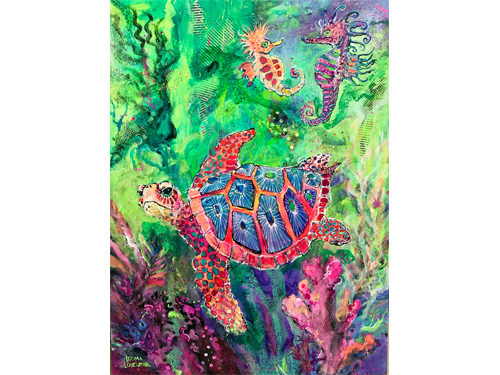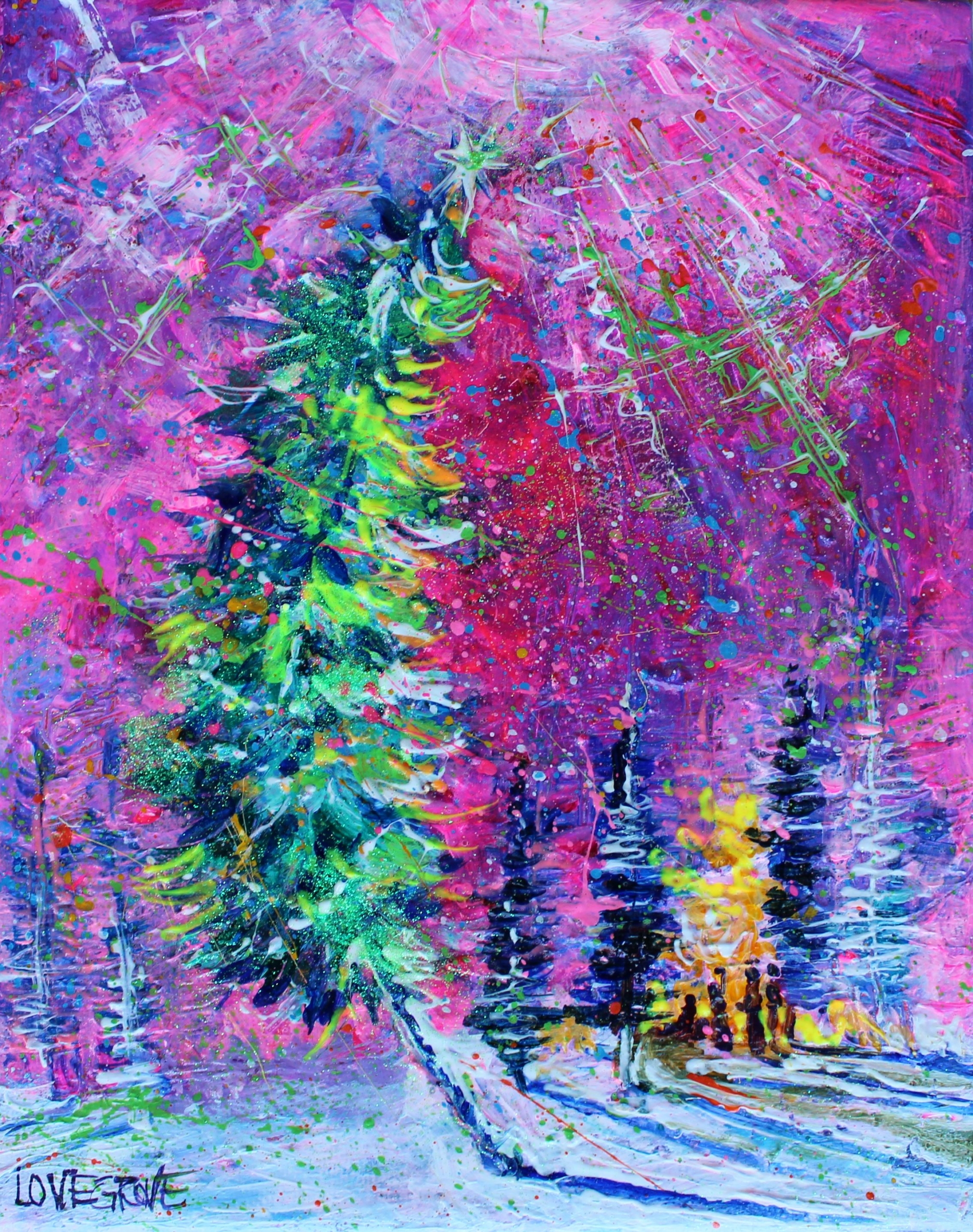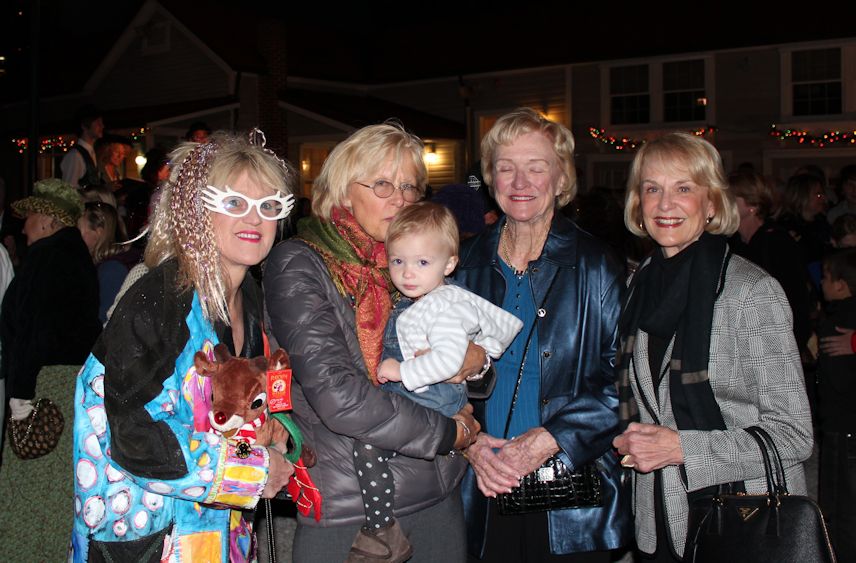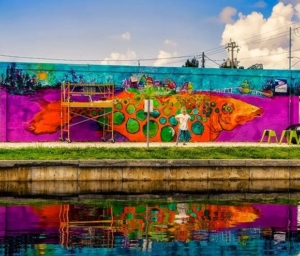 If you have not been to Matlacha Island to visit Lovegrove Gallery & Garden, then you haven’t seen the immense mural I painted on the eastern wall of the post office to greet visitors as they cross over the bridge from the mainland. It’s a great location. Not only is it visible to all westbound traffic, but the mural reflects in the water at the foot of the seawall that runs alongside the building.
If you have not been to Matlacha Island to visit Lovegrove Gallery & Garden, then you haven’t seen the immense mural I painted on the eastern wall of the post office to greet visitors as they cross over the bridge from the mainland. It’s a great location. Not only is it visible to all westbound traffic, but the mural reflects in the water at the foot of the seawall that runs alongside the building.
I call it The Catch of Matlacha Island. It depicts a large orange fish with brightly colored studios and shops on its back symbolizing how the island’s enclave of artists, sculptors, musicians and 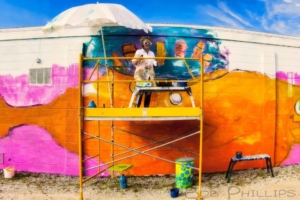 authors built a new Key West from the ashes of the fishing community that thrived here between the 1930s and 1992.
authors built a new Key West from the ashes of the fishing community that thrived here between the 1930s and 1992.
What happened in 1992? That’s when Florida voters approved a net ban referendum that put the island’s mullet fishermen out of business. The fishermen were so upset by the vote that they burned their boats that night. The fire from the bonfire was so bright it could be seen on Fort 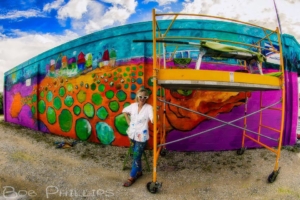 Myers Beach.
Myers Beach.
For a time, the island was faced with financial ruin. But then, artists, sculptors, authors and musicians began buying up the fishing shacks and bungalows, opening galleries, studios, gift shops and even bars and eateries to take their place. I was one of the artists who came to the island in the aftermath of the net fishing ban. While no one wanted to see the fishermen lose their livelihood, the efforts of the visual and 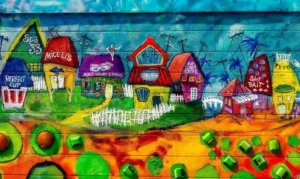 performing artists who took their place is a testament to Matlacha Island’s ingenuity, resilience and pioneering tradition. We’re a tough bunch that endures even in the face of seemingly insurmountable odds.
performing artists who took their place is a testament to Matlacha Island’s ingenuity, resilience and pioneering tradition. We’re a tough bunch that endures even in the face of seemingly insurmountable odds.
I chose to feature a tarpon in the mural because the Silver King made our waters famous between 1884 and 1908. Back then, wealthy industrialist, merchants, stockbrokers and celebrities flocked  to George Shultz’s Tarpon House and Fort Myers to try their hand at tarpon fishing. Among them was Standard Oil CEO Ambrose McGregor and his wife, Tootie. The Silver King even played a role in attracting Thomas Edison to the area.
to George Shultz’s Tarpon House and Fort Myers to try their hand at tarpon fishing. Among them was Standard Oil CEO Ambrose McGregor and his wife, Tootie. The Silver King even played a role in attracting Thomas Edison to the area.
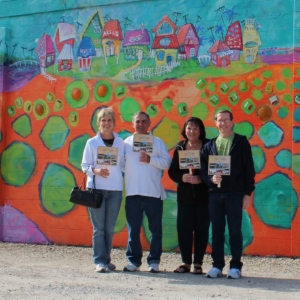 The tarpon is known worldwide for its shiny, metallic looking scales which resemble “a hundred brilliant looking glasses” when the fish leaps into the air. I incorporated some reflectors inside the fish’s scales. They’re from the old bridge, which was known for decades as the “fishingest bridge in the world.”
The tarpon is known worldwide for its shiny, metallic looking scales which resemble “a hundred brilliant looking glasses” when the fish leaps into the air. I incorporated some reflectors inside the fish’s scales. They’re from the old bridge, which was known for decades as the “fishingest bridge in the world.”
A friend of mine teases that I should have painted a snook. Historically, the snook was the fish that Matlacha’s early settlers lived on when they came to The Fill (as our island was known back then) in the late 1920s and early ’30s. For years, the old timers told stories about how legendary the fishing was back then. They claim that they’d catch as many as three or 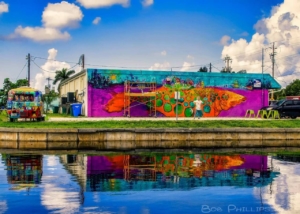 four dozen snook in just an hour or two, many weighing as much as forty or fifty pounds. They could also net 2,000 shrimp in less than an hour. Can you imagine?
four dozen snook in just an hour or two, many weighing as much as forty or fifty pounds. They could also net 2,000 shrimp in less than an hour. Can you imagine?
The Matlacha Island Chamber of Commerce sponsored The Catch of Matlacha Island. They not only wanted a landmark to welcome visitors to the island, the Chamber wanted to send a message about the importance of keeping island area waters healthy for fish spawning and habitats for years 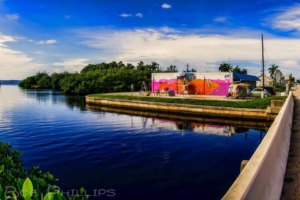 to come.
to come.
Make plans to visit us on Matlacha Island soon. You’ll discover that there’s lots to see and do here whether your passion is art, souvenir shopping, kayaking or just dining out.
